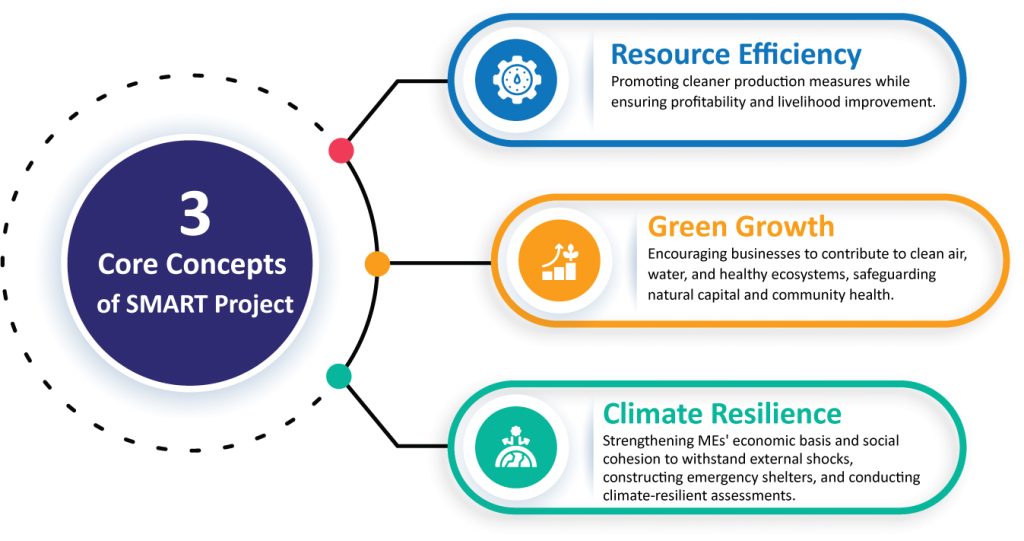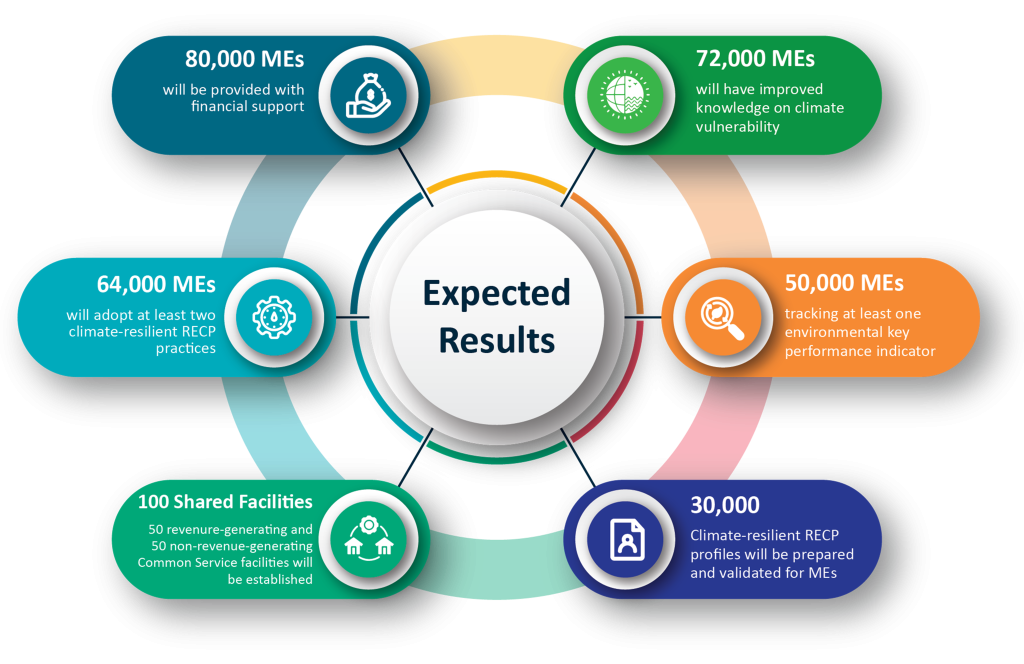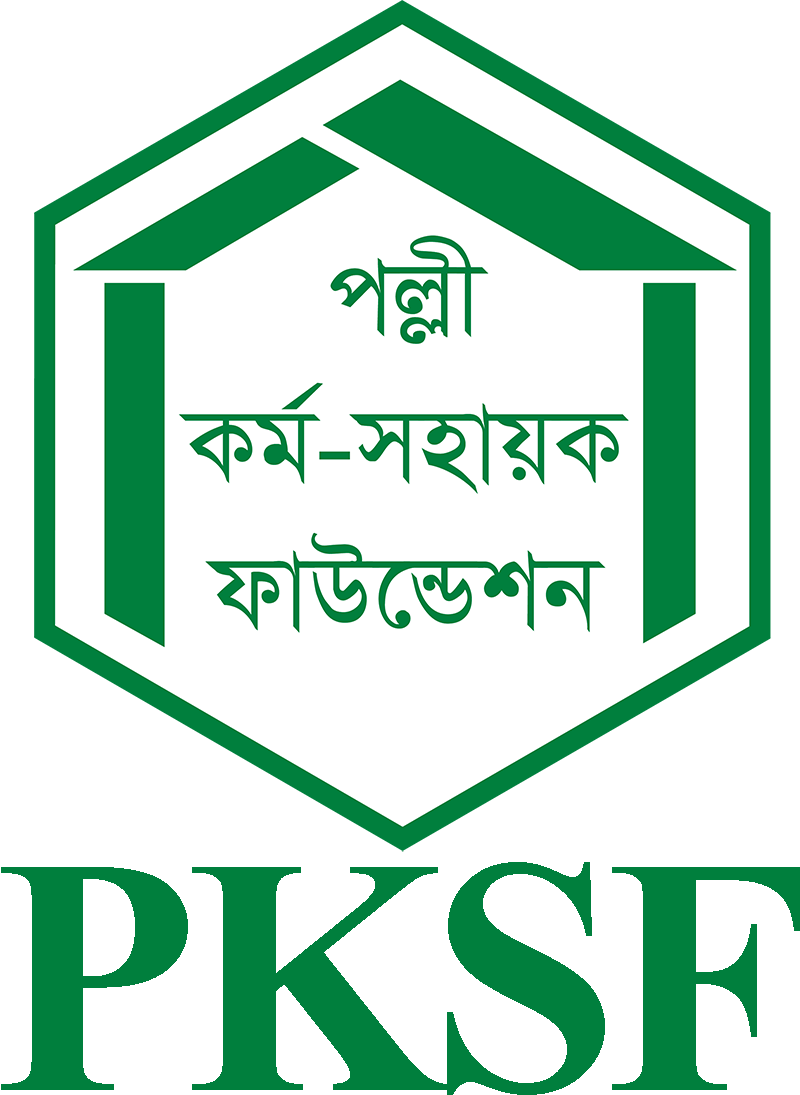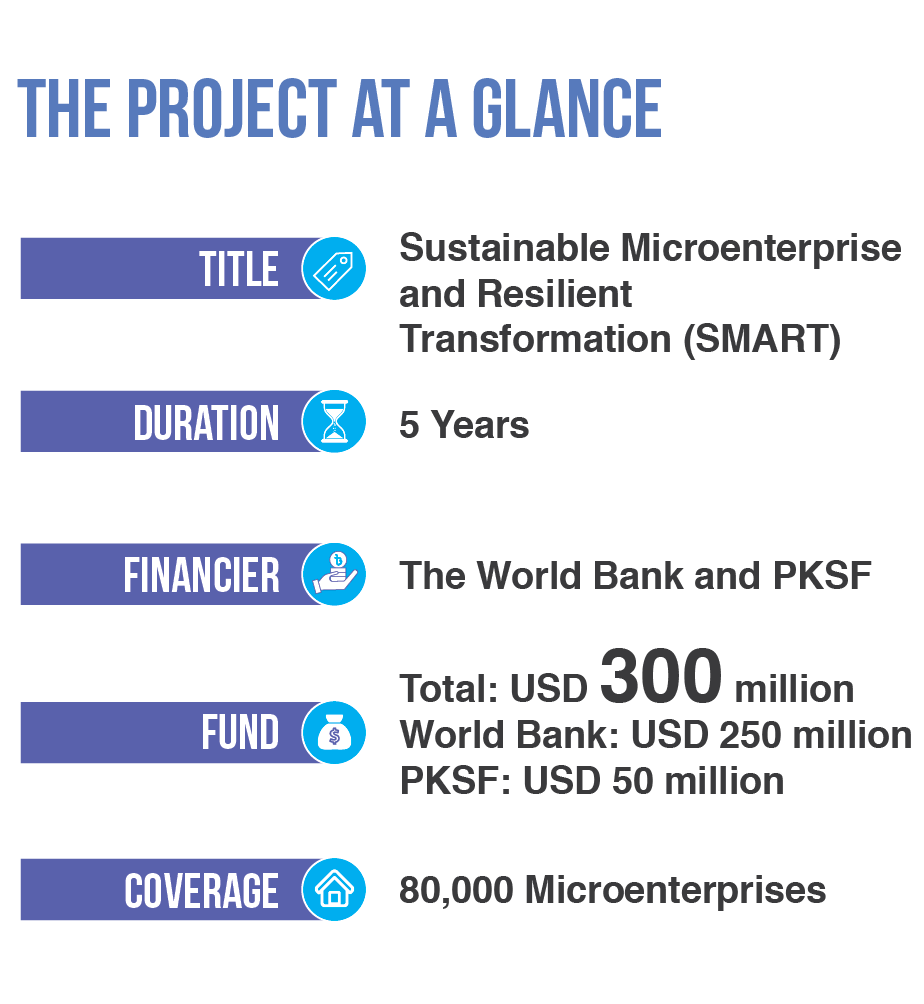The rapid expansion of the microenterprise (ME) sector has played a pivotal role in propelling Bangladesh’s recent social and economic development, leading to consistent GDP growth and a reduction in poverty rates. About half of Bangladesh’s population depends for its livelihood on 9 million microenterprises. These microenterprises constitute 56 percent of the country’s total employment and 25 percent of its GDP. However, they face challenges in achieving sustainable growth, primarily due to the absence of targeted policies and institutional limitations. Additionally, MEs lack awareness of resource efficiencies, cleaner production methods, and access to financial resources required for implementing climate-resilient and environmentally friendly practices, often leading to unsafe working conditions and the production of contaminated goods.
PKSF has been working for the MEs, expediting poverty reduction by expanding opportunities for self and wage employment in Bangladesh. PKSF recognized that embarking on a pathway of green growth for the MEs will provide major benefits for the country, allowing Bangladesh to access new markets, generate public goods, and reduce vulnerability to climate shocks.
About SMART Project
PKSF has undertaken the Sustainable Microenterprise and Resilient Transformation (SMART) project to promote climate-resilient Resource Efficient and Cleaner Production (RECP) practices and technologies among MEs. This, in turn, will equip the MEs to anticipate, prepare for, and respond effectively to climate-related challenges.
The SMART project focuses on providing support to microenterprises operating in agribusiness, manufacturing, and services, with a specific emphasis on environmentally stressed areas susceptible to climate change and natural disasters. Additionally, the project aims to foster changes within the microcredit ecosystem, encouraging the development of environmentally friendly businesses and the adoption of operational safety standards within microenterprises.
SMART project places significant emphasis on capacity building, technology adoption, knowledge dissemination, and behavioral change among microenterprises. This multifaceted approach ensures the promotion of green growth solutions that are both sustainable and beneficial for the environment.
To maximize environmental and climate co-benefits, SMART project laid out interventions based on priority principles, including business clusters, pollution reduction, ecosystem preservation, economic and climatic vulnerability, and potential for replication and scaling.
Objective
The objective of SMART is to increase resource-efficient and resilient green growth of microenterprises (MEs).
The objective encompasses three key concepts aimed at guiding microenterprises toward more sustainable business models:

Budget
The total budget of the Project is USD 300 million, of which the World Bank and PKSF’s contribution is USD 250 million and USD 50 million respectively.
Project Components
1. Enabling Capacity and Systems for Green Growth of MEs
2. Providing Access to Finance for MEs to enable green growth
3. Improving PKSF Project Management, Communications, Monitoring and Evaluations, and Knowledge Management
This Component will use a more institutionalized approach through conducting technical resource-efficiency, environmental and climate adaptation technology, and environmental assessments. This will select and prioritize climate-resilient RECP practices and develop environmental and financial digital tools to support business plan development that considers economic benefits in a climate hazard situation. The Component will support two types of MEs: those starting new green businesses and those willing to convert existing businesses to more climate-resilient ones and introduce digital tools and climate-resilient RECP. This Component will enable MEs to adopt changes in their existing business practices and build awareness of critical environmental issues.
Subcomponent 1.1: Enhancing MEs' environmental-knowledge capacity
This subcomponent provides grants to POs to increase MEs’ technical knowledge and capacity, identify improvement areas and promote skills among MEs to increase their climate resilience. The activities will include awareness-raising campaigns to enable the project's sustainability and galvanize behavioral change. This subcomponent aims to ensure that MEs receive the necessary support (demonstration of climate-resilient RECP, technical capacity, skills development) to adopt climate-resilient RECP in their operations.
Subcomponent 1.2: Enhancing common facilities and enabling environmental systems for MEs clusters
This subcomponent will provide support for non–revenue-generating common facilities (NRG) to promote inclusive, green growth outcomes to enhance MEs' growth, competitiveness, and productivity. NRG will include structures that are public in nature and reduce pollution and increase resource efficiency and climate resilience. However, these types of activities require a non-commercial approach. As such, support will be provided as grants and is expected to result in improved climate resilience and resource savings at the cluster level. While the project will fund the establishment of the common facilities, the project participating MEs will continue to maintain and improve if required. This subcomponent aims to support common facilities that have a critical influence on the productivity of MEs and ME clusters. These common facilities will be owned and maintained by the local community.
Subcomponent 1.3: Enabling MEs to develop a green value chain and expand markets for green products
This subcomponent will support MEs access to domestic, regional, and international markets including eco-labelling of their products or services as "safe, organic, green, agroecological," for instance. Eco-labeling will be prepared after assessing certain criteria for various products/services manufactured with the use of climate-resilience RECP. This subcomponent will help MEs to access and learn the relevant national and local level associations working on "safe, organic, green, agroecological" products and existing guidelines. This subcomponent will also support MEs to obtain certification for their products by collaborating with relevant government and private agencies. Special outreach and support will be provided to women-owned MEs. Additionally, this subcomponent will support the use of e-commerce platforms to improve ME sales and outreach.
Under this line of credit component, PKSF through its POs will provide loans to MEs to implement commercially viable investments in climate-resilient RECP. The financing is expected to benefit MEs inclusive of the value chain operating in the selected 21 subsectors across agriculture, manufacturing, and services. However, based on exceptional climate-resilient RECP, pollution abatement cases and growth potential additional subsectors may be included. This component uses the success of microfinance in Bangladesh to better target environmentally friendly and climate beneficial activities informed by Component 1.
Subcomponent 2.1: Provision of Line of Credit for sustainable climate-resilient RECP practices and technologies to provide sub-loans to MEs that adopt sector-appropriate climate-resilient RECP business improvement measures. The improvements by recipient MEs will be monitored using technological devices and digital tools that are expected to feed into introductory use of big-data analytics at PKSF end. Additionally, this subcomponent will support borrowers who are interested in updating their existing business or launching a new business or activities featuring climate-resilient RECP. Additionally, sensitization activities will be carried out for POs to raise awareness of relevant policies on extending credit to women owned MEs under Component 1.
Subcomponent 2.2: Provision of Line of Credit for revenue-generating common facilities to establish and upgrade the common facilities that promote RECP and pollution reduction, and overall productivity of MEs. The common services may be owned and managed by an ME or community of MEs (but not the PO) and can include fee-based commercially viable business like vermicompost, recycling center, common service center providing training and job works, milk-chilling facility, storage facilities, and so forth.
This component will ensure timely and effective project implementation by building PKSF’s institutional and organizational capacity to expand the use of digital tools, data analysis, effective business practices, communications, M&E, and knowledge management. Activities under this component will help institutionalize and strengthen environmental and climate-change units (ECCUs) with additional RECP knowledge and activities at the PO level. Specifically, this component will provide support to subproject design and monitoring, climate-change adaption mitigation and environment screening checklists, guidelines, and identify capacity building needs.
Subcomponent 3.1: PKSF’s Project management and enhanced capacity
The project will support PKSF in establishing a Project Management Unit (PMU) to implement the project effectively. The PMU will be responsible for executing overall monitoring of the project. It will also include trainings to enhance awareness and knowledge of new technologies and best practices for effective project implementation.
Subcomponent 3.2: Communications, Monitoring, and Evaluations (M&E)
This will include enhancing the capacity of the PMU to carry out communications, monitoring and evaluation activities. This will require implementing a digital system-based project management tool, enhancing PKSF’s capacity to adopt a more systematic data management approach, and enhancing the technical environmental and climate-change capacity of PKSF’s ECCU, especially in knowledge management and climate-resilient RECP practices.
Subcomponent 3.3: Knowledge management
This will include supporting the generation and sharing of knowledge of all Project participants (the PMU staff, PO staff and MEs). Knowledge management will aim to maximize the learning of all actors and capture achievements and lessons learned in different forms, from communications to analytical studies, radio interviews and instruction videos for almost any product. This subcomponent will contribute to the design of new learning through events and trainings based on the demands generated through implementation. PKSF will conduct cluster and/or product-specific studies, as needed, that will help POs undertake the activities in components 1 and 2.
Snapshots of Expected Results at the end of the Project


